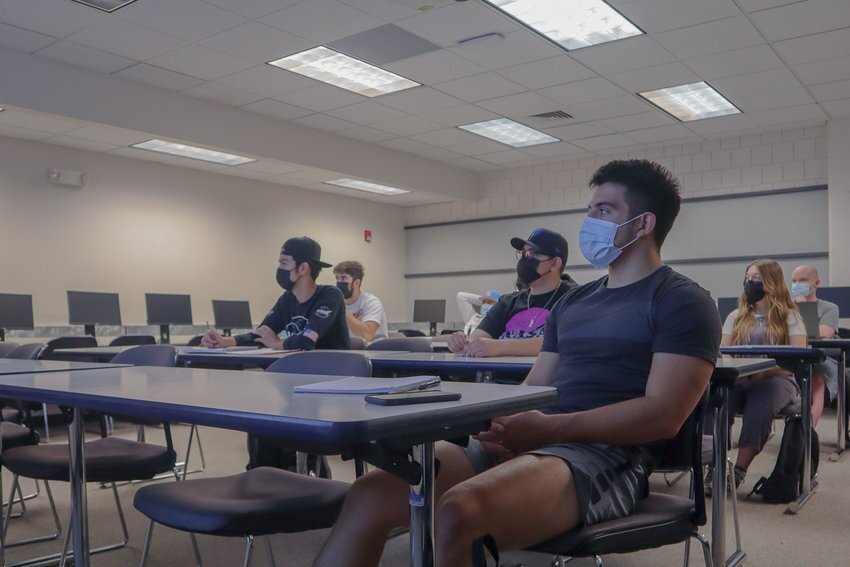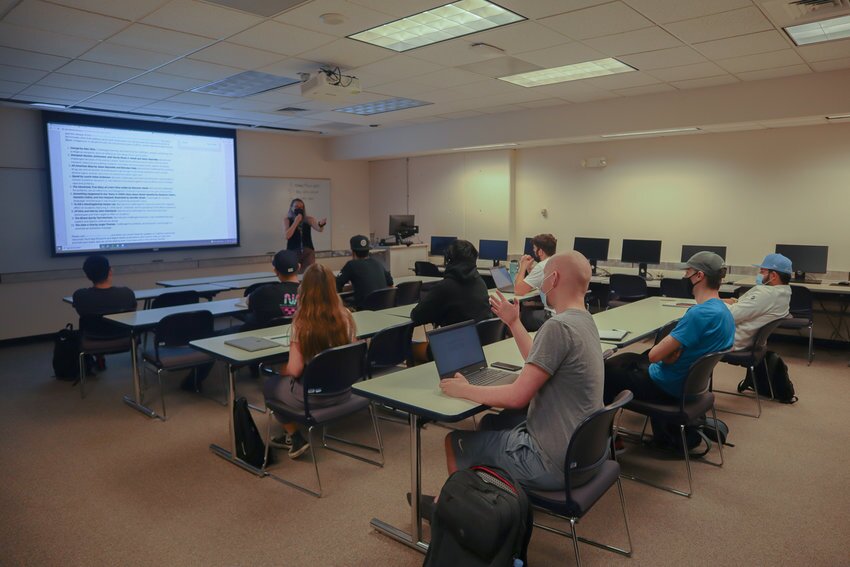Free community college proposal excites Colorado students, educators

LITTLETON, Colo. — After graduating from high school, Jake Smith didn't think he'd make it in college. He struggled academically and he didn't have the money to afford more education until he joined the Army.
For nine years Smith served as an active member, seeing military subsidies as his only path to affording tuition. At the age of 28, Smith finally enrolled at Arapahoe Community College (ACC) and used the GI Bill to cover the cost. But he wished there could have been a different way.
“To ask people to go through some of the things that I had to go through just to get a GI Bill, I don't think that's fair,” Smith said. “We were in bad situations and we needed to do something to get out of those situations.”
But beginning in 2023, millions of Americans may for the first time ever have the choice to attend a community college for free, no strings attached. Democrats in Congress are currently hashing out the details of an ambitious multi-trillion-dollar budget bill, dubbed the Build Back Better Act, that would provide universal tuition-free community college for every American, a cornerstone of President Joe Biden's economic agenda.
“I'm completely for it,” Smith said of the proposal. “If we're going to require people who live here in America to contribute to society but they have to go to college to do so, I don't think that we should be making people pay.”
Removing barriers
At ACC—based in Littleton, with campuses in Parker and Castle Rock—the idea of free community college is exciting for some faculty members.
“I'm a huge fan of the idea,” said Monica Fuglei, chair of the English department at ACC.
For Fuglei, it was a scholarship that allowed her to attend college when she was an undergraduate.
“I often tell my students that was the difference between me sitting in the chair that I sit in today and perhaps being elsewhere in the world,” she said.
Fuglei said Congress' proposal would be a massive step toward removing the economic barriers of higher education.
Even at a college like ACC, which offers lower-cost annual tuition students can still struggle financially. ACC's tuition for residents this year was $3,680, but after piling on books, room and board and other expenses, the price for a degree can jump to more than $23,000. For non-residents, it can be up to $31,606. Fuglei said she has known numerous students who have had to drop out, often because they could no longer afford the cost.
“Those are really tough days,” she said. “I have had students for whom the cost of college became too big … and that's always very heartbreaking for me.”

But the prospects waiting for students on the other side of their two-year degree could mean a world of difference, said Fuglei. Along with the ability to pay for just two years of education for a bachelor's degree, as opposed to four, those with an associate degree are often met with more jobs and greater financial stability.
“(Students) often leave our school and go straight into industry jobs in the area,” Fuglei said. “That's a big impact on an institution, and the idea of expanding that to me is really exciting.”
Smith, the ACC student, said his time in college is setting him on a path for success.
“I love ACC … I feel like I'm getting a valid, solid education,” he said, adding that free community college could help further remove the stigma that he feels still surrounds two-year education.
“When I was growing up, the focus was on people going to the four-years, CU, CSU or even out of state,” Smith said. “But (community college) can really help steer you where to go and you aren't in an incredible amount of debt.”
But the road toward free community college remains murky.
'Devil's in the details'
Congressional Democrats remain at odds over the final price tag of the Build Back Better Act, which is expected to receive no Republican support. This means the bill will have to pass through a special process known as reconciliation, which requires nearly all Democrats to vote in favor of it. A date for when the bill will be brought to a vote has yet to be solidified, although lawmakers are aiming for one within weeks.
Because of this, the final details of the proposal are likely to change, including those regarding free community college.
For Stephanie Fujii, president of ACC, there are many questions about the proposal that still need answers.
“The challenge, like everything, is the devil's in the details,” she said. “Just because community college is free doesn't mean there isn't a cost that's incurred. How we're going to be able to manage that as a state in Colorado is going to be something I look forward to.”
About 61% of ACC's funding comes from tuition, according to Fujii, who said “that's a significant portion to be able to come up with.”
The U.S. House Education and Labor Committee, as part of its role in crafting the legislation of the budget bill, has already approved $111 billion to fund free community college beginning in the fiscal year 2023 and lasting for five years until 2028.
But that money alone will not be enough to fully fund colleges. States will have to make up the difference in order to provide their students with no-cost tuition. In a state like Colorado, that poses some difficulty.
According to Joe Garcia, chancellor for the Colorado Community College System, the federal law currently being drafted is based off national tuition averages, but Colorado’s tuition costs slightly exceed the national average. This means for schools like ACC, Colorado would need to spend more money to subsidize tuition under the current proposal.
Garcia said he and other education leaders from around the country have been in talks with the federal government to find ways to address state budgetary constraints and ensure that the legislation, should it pass, works for everybody.
Despite the hurdles, Garcia said he is committed to championing free community college for all Coloradans.
“We need to change our expectations for what a minimum education should be, and we should be prepared as a society to pay for it,” Garcia said.
Students see opportunity
For Littleton high school students debating their future, free community college could open doors.
“It would be great,” said 17-year-old Elmer Julian “EJ” Herra, a senior at Littleton High School.
Herra said he has thought about attending ACC and then transferring to a university to complete a bachelor's degree. But he fears the full cost of four-year education is too high and is now mulling trade school.

But if ACC should become free as part of Biden and Democrats' budget proposal, Herra said he would be able to fulfill his ambitions of gaining a bachelor's degree.
Nate Coine, an 18-year-old senior at Options Secondary Program, said free community college could mean the difference between how much he is burdened by student loan debt.
“I want to have an education, have a career and not be tied down monetarily by debt,” said Coine, who is also planning to transfer after two years at ACC to attain a bachelor's.
“If (free community college) is a possibility, that would be phenomenal,” he said.
Still, despite wide public support for the proposal, free community college for the coming years is far from a done deal. Acknowledging that they will receive no support from Republican lawmakers, Senate and House Democrats are rallying their own members to vote in favor of the Build Back Better Act. But more conservative Democrats in both chambers have said they will not support it unless the bill's price tag is heavily reduced, meaning certain provisions, like free community college, could be cut.
Herra, the Littleton High School senior, said if that happens, it would dim students' educational futures.
“The fact that they gave them hope and now they're taking the hope away from them is just kind of sad,” he said.
Smith, the ACC student, is hopeful the legislation will pass and that it will support more students like him to pursue degrees, regardless of their situation.
“Everybody should have the same access to education,” he said.
This story originally appeared in Colorado Community Media and has been republished here with permission.